Why Volunteer in Bolivia?
Locals have Needs, the Culture is Giving
By Steph Dyson
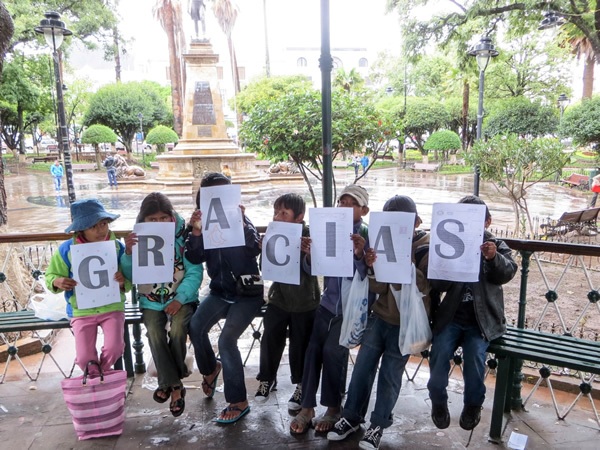
|
Working with the many street children in Bolivia is greeted with much appreciation.
Photo by Steph Dyson.
|
Bolivia’s probably not at the top of your travel list, but this oft-forgotten South American country is a rewarding and fascinating place to volunteer. As a country still plagued by endemic poverty, its current political and economic stability make now an important time for skilled and committed volunteers to help the country achieve crucial development aims.
Volunteers here can also learn about Bolivia’s fascinating cultural heritage. The country is home to the largest proportion of indigenous people in all of South America, resulting in better-preserved traditions and customs than most its neighbors. Thanks to numerous community-led projects, volunteers will find themselves working towards important goals that have a real impact on the Bolivian people.
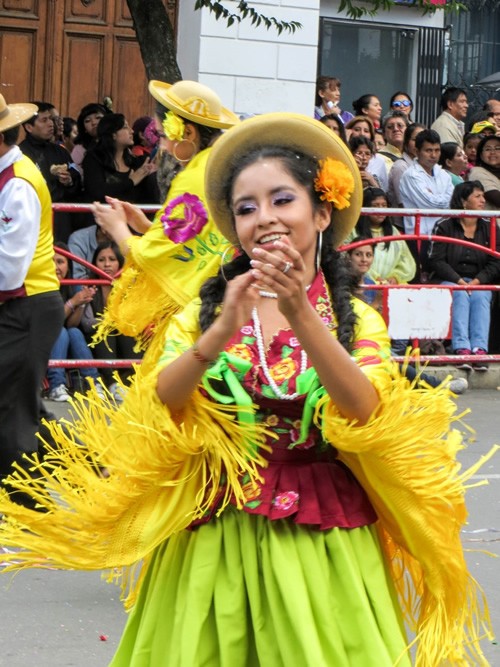
|
The colorful tradition of the Carnival in Sucre.
Photo by Steph Dyson.
|
What Challenges Does Bolivia Face?
Poverty is the largest issue facing Bolivia. 8% of the population live in extreme poverty — that means surviving on less than $1.25 a day. However, because of the geographical challenge posed by the Andes Mountains, poverty disproportionately affects those in rural areas, with 95% of rural dwellers living in poverty — the highest rate in the world.
Education and Health Care
Sanitation facilities and access to health care and clean water are not readily available across the country, and access is limited in rural areas. Children from wealthier families and those living in cities are significantly more likely to receive an education, while 17% of high school aged children are not in school.
Child Labor
Child labor is also a prevalent problem, with children as young as ten legally allowed to work. Data suggests that at least one million children between the age of five and 17 do so, and a report by the Bureau of International Labor Affairs (part of U.S. Dept. of State) issues yearly reports about the treatment of children in Bolivia, in labor and otherwise (PDF), that are not very encouraging.
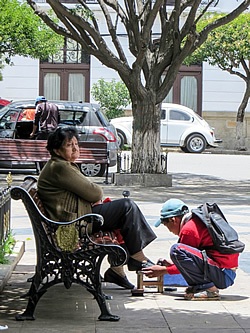
|
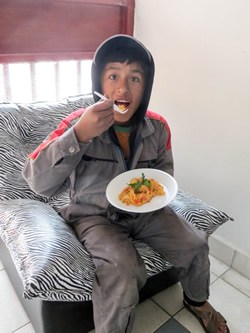
|
|
Street working child shining shoes.
|
Child street worker eating lunch served by volunteers. Photos by Steph Dyson.
|
Gender Inequality
Gender inequality and domestic violence are also a huge cause for concern in Bolivia. With the highest rates of domestic violence against women in Latin America, more than half of women aged between 15 and 49 have experienced violence at the hands of a partner. Traditional attitudes towards women also mean that access to basic working rights is not forthcoming: while 77% of women work in rural agriculture, only 9% are formally employed and entitled to healthcare, insurance, and other social security benefits.
Environmental Issues
Climate change is also affecting the availability of water, with two million people in the de facto capital of La Paz and neighboring El Alto reliant on glaciers for drinking water. Flooding caused by extreme weather patterns has also destroyed homes in the Amazon, while the illegal trafficking of wild animals has been rising steadily. In addition, at the end of 2016, La Paz suffered the worst drought in 25 years with water shortages caused by a mixture of climate change and poor government planning.
What Makes Bolivia Such a Rewarding Place to Volunteer?
As one of the lesser-visited countries along the South American “gringo” trail, Bolivia has acquired a misplaced reputation for being dangerous and difficult to navigate. In my experience volunteering and traveling in Bolivia for almost a year, this is certainly not the case. Those who give this country a chance will quickly learn that it’s full of humble people with real pride in their culture and an interest in foreign visitors, particularly those who are respectful and take the time to learn Spanish.
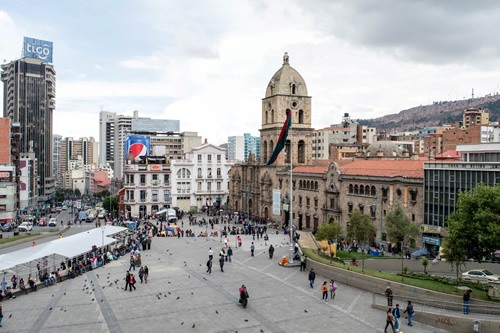
|
|
The lively city of La Paz.
Photo by Steph Dyson.
|
You’ll Feel Part of Community-powered, Grassroots Development
With few travelers choosing to volunteer in Bolivia, it’s not likely you’ll find yourself surrounded by other foreigners. Instead, you’ll have the chance to become a real part of the community and have more extensive interactions and learning opportunities with those who matter: the local people.
As Rolando Mendoza, founder of La Paz-based Up Close Bolivia points out, volunteering in Bolivia is about fulfilling the demands of "reciprocity" which is “at the heart of Andean culture. It is all about giving back and contributing in a way which enriches both the person who is giving and the person who is receiving, equally.”
The best part about volunteering in Bolivia is the mutual exchange of learning and the knowledge that it can bring. For me, Bolivia showed how powerful we are when we work together, as I was always struck by the strength of community spirit, pride, and unity found in the tiny villages I visited.
It was eye opening to see such a strong commitment to democracy in each village, where a new leader is elected each year and meetings are held regularly to discuss any proposals that might affect the community. I regularly saw how people feel invested in working together to change their futures collaboratively, and this is one of the best lessons that volunteers can take away from their time in Bolivia.
Your Skills and Professional Expertise Have a Long-term Impact
Whether you’ve spent the past decade working in business, have a degree in accounting, have worked in social media or marketing, or are a qualified health professional or teacher, there’s always space for you to support local people and offer an exchange of skills.
Milli Spence, the Assistant National Director for Cochabamba-based Responsible Bolivia, believes that Bolivia is in need of skilled individuals. While there exist “many innovative grassroots organizations which offer amazing volunteering opportunities to work in various critical fields such as environment, social care, and health, these organizations often lack human and financial resources to fully realize their goals. Volunteers with the right language level, relevant skills, and time commitment offer much-needed support and technical expertise to achieve these goals.”
While it’s not impossible to volunteer in Bolivia without professional skills (there are organizations who accept volunteers, regardless of their background), having something tangible to offer is a better guarantee of your impact. Volunteering isn’t just for those looking for a gap year experience: mid-career professionals with relevant experience are always in demand.
Bolivia’s Looking for Role Models Like You
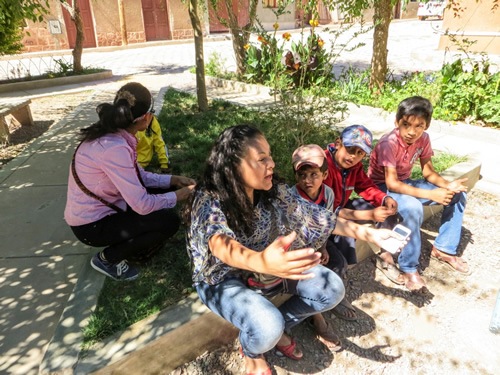
|
Volunteers mentoring and helping rural children.
Photo by Steph Dyson.
|
While the development of new skills is important, volunteering can have other profound effects. I’ve seen the powerful impact that volunteers can have as role models. As an unmarried, foreign woman, independent, and traveling alone, I’ve been able to demonstrate an alternative narrative to young girls taught that their ultimate goal in life is to marry and have children. The thought of ever leaving their community to live in another city, let alone another country, was not one that many had ever previously entertained.
Maritza, the Director for Sucre-based, literacy NGO, BiblioWorks, views this as significant, explaining that “people here, especially children, need to encounter visitors from around the world who can help them in their self-development.”
Maritza also sees volunteers as having a profound impression upon the adults that they meet too: “volunteers can help spread their helpful spirit in a country where few local people yet volunteer,” thus helping to motivate locals to see the benefits of volunteering and working alongside other nationalities.
You’ll Learn About Life in One of South America’s Most Traditional Countries
Unlike neighboring Peru, where some cities are tailored for tourism and can often feel at once overwhelming and artificial, Bolivia’s tourism industry is far less established. Volunteering in Bolivia offers a guaranteed insight into authentic day-to-day life in a developing part of South America.
Traditional customs for its Quechua and Aymara indigenous groups are visible wherever you turn: women wander the streets dressed in polleras (pleated skirts) and bowler hats, carrying babies in a piece of aguayo (colorful striped traditional weaving) tied to their backs. Ceremonies celebrating and giving thanks to Pachamama (Earth Mother) are a regular occurrence. The guidance and magic potions created by witch doctors can still be found in the markets of each city, town, and village.
If you want to see South American life away from the tourists, Bolivia is the place to volunteer. It’s an eye-opening experience as you are forced to encounter the ugly reality of poverty, but it leaves you with a much clearer view of what you should most appreciate in life, and a chance to celebrate a diverse culture that has survived despite facing numerous challenges.
Brushing up Your Spanish Language Skills is Easier
Bolivia has four official languages (Quechua, Aymara, Guaraní, and Spanish) and 33 other native languages, with only around 60% of the population speaking Spanish. That said, it’s still a great place to learn: you’ll find that many people who speak Spanish as their second language do so much more slowly and clearly than those for whom it’s their mother tongue.
Learning enough Spanish to communicate comfortably is essential if you want to truly get to know and understand Bolivia. Few outside of the main tourist hubs (such as the very center of La Paz, Uyuni, and Sucre) speak any English, so you’ll find yourself practicing your new language each day.
I’ve heard many tourists accuse Bolivians of being unfriendly and in my experience this can be the case, but only if you don’t make an effort to speak Spanish. Language lessons can cost as little as $8 for an hour’s private tuition, making it one of the cheapest places on the continent to learn.
You Can Stay Longer: Volunteering and Living Costs are Affordable
As with any volunteering placement, committing to a decent period (at least a month, but preferably more) is essential to supporting sustainable development. Luckily, Bolivia is one of the most affordable South American countries, where you can easily live comfortably for less than $20 a day.
Traveling around Bolivia is also very affordable, meaning that weekends can be spent exploring the country beyond your volunteering home. You can visit Parque Madidi, one of the world’s most diverse sections of jungle near the northern town of Rurrenabaque. Or witness the surreal, optical illusions created by the vast expanse of salt on the Salar de Uyuni and enjoy the stunning colonial architecture of the capital Sucre. With so much to explore, you’ll be pleased that you have some spare money to make the most of your stay.
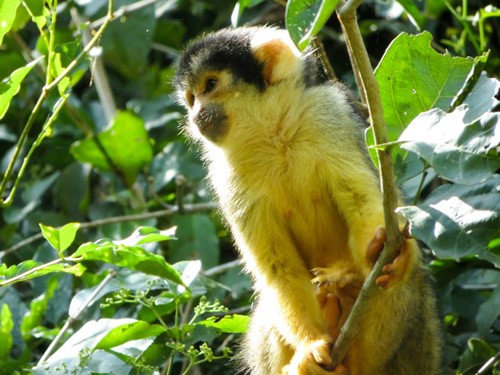
|
|
Monkey hanging out in the the jungle of Rurrenabaque.
|

|
|
The salt fields of the Salar de Uyuni.
|
Where Can You Find the Best Volunteering Opportunities in Bolivia?
Cochabamba
A university city regarded as having the best climate in Bolivia, Cochabamba is a lively and friendly location in which to volunteer. Boasting the huge outdoor market, La Cancha, which dominates an entire block in the south of the center, and easy access to nearby national parks and the stunning countryside, Cochabamba is bustling with life.
Recommended Organizations
Mano a Mano
Working for the social development of some of Bolivia’s poorest communities, Mano a Mano delivers comprehensive programs in health, education, and road infrastructure. They require volunteers from all backgrounds to help with a range of tasks, from clerical work to manual labor.
Find out more about volunteering by visiting their website.
Responsible Bolivia
A non-profit community with many partner organizations,
Responsible Bolivia promotes economic and environmental sustainability
by procuring human and financial resources for their partners.
They seek volunteers for a range of areas including education,
youth services, environmental conservation, healthcare, agriculture,
the arts, and research. Mini-grants for volunteers are available.
Find out more about their volunteer and internship program.
La Paz
The de facto capital city — and located at one the highest elevations in the world at 12,000 feet above sea level — La Paz is a noisy and exciting place to experience Bolivia. While tourists seem to either love it or hate it, it has European-style restaurants, bars, and shopping malls, making it one of the more comfortable places to volunteer. That said, La Paz acts as a microcosm for Bolivian society: you’ll soon notice the extreme inequality between the standard of living for those in El Alto, at the top of the city, and Zona Sur, lower in the valley.
Recommended Organizations
Comunidad Inti Wara Yassi
CIWY has been working for more than 20 years in rehabilitating and caring for animals that have been victims of illegal trafficking, conserving wild flora and fauna, and educating the Bolivian public to respect wildlife. They have three Wildlife Custody Centers: Machía (near Cochabamba), Ambue Ari (near Santa Cruz), and Jacj Cuisi (in Rurrenabaque, north of La Paz). They seek volunteers interested in working with their rehabilitated animals (including wild cats and monkeys) and specific time commitments are required to work with certain species.
Find out about their volunteering programs.
Sucre
Most travelers' favorite Bolivian city, the capital Sucre is a charming mix of colonial-fronted architecture, pleasant restaurants and bars, and stunning surrounding countryside. As a small city, it might feel overrun with tourists at times, but there are plenty of opportunities to escape to nearby rural communities where you may attend regularly held cultural events and festivities.
Recommended Organizations in Sucre
BiblioWorks
Founded in 2005, BiblioWorks is an NGO that builds libraries in rural communities. Volunteers are needed to work in the libraries, either teaching English or acting as “Literacy Ambassadors” to encourage young people to read. Opportunities to work in their Sucre-based office are also available.
|
Advice for Living in Bolivia
Transport
International flights land in Santa Cruz and La Paz, although it’s inadvisable to fly directly to El Alto airport in La Paz since it’s located at a breath-taking 13,320 feet above sea level.
Bus travel around the country is regular and reasonably comfortable, although accidents have been known to happen. Check with your volunteering organization for a list of recommended companies and pay the higher end of the scale for buses to ensure your safety. Cheap flights between cities are available and make covering great distances significantly quicker.
Accommodations
Volunteering organizations can often help you to find reasonably priced accommodations or home stays. Depending on your location, accommodations are available from $80 to $300 per month, with varying standards in facilities and comforts.
Visas
Tourists are granted a 30-day tourist visa upon entry to the country and which can be extended at the immigration offices in every city. US citizens are required to pay a fixed price of $160 that allows entry of up to 90 days per calendar year into Bolivia, and is valid for five years. Staying in the country any longer requires you to go through the complex process of gaining a residency permit. Visa rules change regularly so make sure you check with your volunteering organization.
Food
Bolivia is incredible cheap when it comes to food, thanks to the plethora of fresh fruit and vegetables available at its markets and from street food stalls. Restaurants also offer a set price on a cheap almuerzo or lunch menu (often around 10 bolivianos/$1.50).
Health and Hygiene
The tap water in Bolivia is not safe to drink, so bringing a water filter (or paying 5bs per bottle of water, a less environmentally sound approach) is recommended. To evade traveler’s diarrhea, it is advisable to bring hand sanitizer, and avoid buying drinks on the street that are unlikely to have been prepared using bottled water.
The most common complaint by visitors to La Paz, Potosi, Uyuni, and other high altitude cities is altitude sickness. This altitude illness should be treated seriously; if symptoms of nausea, nosebleeds or headaches do not improve, you should drop to a lower altitude as quickly as possible. Coca tea is a useful local method of dealing with this ailment, and combined with drinking plenty of water and avoiding too much excursion, is the best way of becoming acclimatized.
Rabies jabs and yellow fever are recommended, particularly if you plan to be volunteering in rural areas, away from immediate medical attention. Anti-malarial tablets and mosquito spray are recommended if working in the jungle.
Attitudes Towards Women and Foreigners
Women will experience some sexual harassment on the streets in the form of wolf whistling, or shouts of qué linda (“beautiful”), and the best way to handle such events is simply to ignore the noises and their origin. I never felt myself to be more than a little uncomfortable as a result of this unwanted attention, although ensuring that you are conservatively dressed is the best strategy.
Bolivia is one of the more formal nations in South America with regard to language, where por favor, gracias, buenos dias, and the use of the usted form will go a long way towards people being helpful and friendly.
Safety
Contrary to popular belief, Bolivia is ranked safer by the U.S. State Department than nearby, and far more visited, Peru. Muggings are a possibility (particularly at nighttime and in less salubrious parts of town), and criminal activity is rare in rural communities.
Being aware of scams involving locals posing as police officers and asking to see your documents or to accompany them to the police office, as well as avoiding flagging down taxis in some of the cities (mainly La Paz and Santa Cruz), will also increase safety.
Connectivity
WiFi access varies significantly from reasonable to non-existent. In rural locations, it’s unlikely you will have any access, but cities with internet cafes are often only a couple of hours on the bus. Local SIM cards can be acquired (but do require the SIM to be registered at the network provider’s local office with a photocopy of your passport) and can guarantee reasonable internet connection.
|
Steph Dyson is a travel writer and volunteer who advocates slow, adventurous travel. Since 2014, she has been living, volunteering, and simply breathing everything that is South America. Find her at www.WorldlyAdventurer.com.
|
